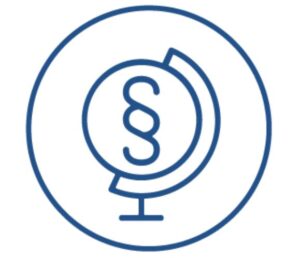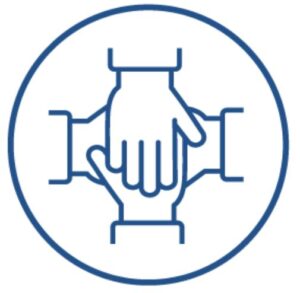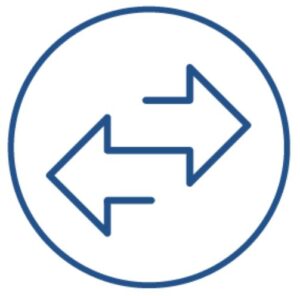Nordic Programme for Co-operation on Disability Issues 2023–2027
The Nordic Council of Ministers’ programme for cooperation on disability issues between 2023 and 2027 has been endorsed. The plan is implemented under the auspices of the Nordic Council of Ministers for Health and Social Affairs Policies (MR-S), but it involves several policy areas. The UN Convention on children (CRC), the Rights of Persons with Disabilities (CRPD), the 2030 Agenda and the Nordic Council of Ministers’ strategic documents are fundamental to the plan, which has three focus areas: human rights, sustainable development and freedom of movement.
The Council of Nordic Cooperation on Disability shall contribute to the integration of the disability perspective into Nordic cooperation and shall contribute to the UN Convention on the Rights of Persons with Disabilities (UNCRPD) being translated from words into action. The Council of Nordic Cooperation on Disability participates in work on the design and implementation of the Nordic Council of Ministers’ programme for cooperation on disability issues. The Nordic Welfare Centre is responsible for supporting the implementation of the programme.
Read and/or download the Nordic Programme for Co-operation on Disability Issues 2023–2027
Within each area, there are three different activities, involving several different policy areas.
The Action Plan’s focus areas:
Focus area: Human rights
The United Nations’ Convention on the Rights of Persons with Disabilities (UNCRPD) aims to promote, protect, and ensure that all persons with disabilities have full and equal enjoyment of all human rights and fundamental freedoms, as well as to promote respect for their inherent value. All the Nordic countries have ratified the UNCRPD and implement the convention’s principles and norms.
There are several challenges shared by the Nordic countries as well as a common need for greater and better knowledge and positive examples of successful implementation. Activities within the human rights focus area not only support UNCRPD implementation processes but also involve other conventions and efforts relating to human rights and disability in general.
In addition to the activities within the focus area, efforts relating to human rights are strengthened by way of the support scheme for Nordic co-operation among disability organisations, and the deafblind activities that the Nordic Welfare Centre is responsible for.
Nordic deafblind activities are rooted in the implementation of the UNCRPD for people with a combined visual and hearing impairment, which is a vulnerable and marginalised group in society.
In order to strengthen the children’s and young people’s perspective in Nordic co-operation on disability issues, an annual expert meeting will be arranged with representatives from interest groups for young people with disabilities.
Read more in the programme: Human rights
Focus area: Participation
To strengthen inclusion, promote equality and inclusion, and tackle discrimination against people with disabilities from a diversity perspective in all aspects of Nordic society through the strategic integration of the disability perspective in efforts relating to sustainable development by way of the universal design of physical and digital environments.
The sustainable development of the Nordic welfare model is based on the ability of as many people of working age as possible to be in employment. The labour market is a driving force in Nordic welfare societies and is of central importance to the business sector as well as to individuals. A large and competent workforce, good working conditions, and a good work environment are crucial for creating a green, competitive, and socially sustainable Nordic Region. This requires an inclusive education and labour market policy. It also requires information initiatives and efforts to change attitudes among employers, employees, and society at large in order to provide opportunities for people with disabilities to establish themselves in the labour market.
Rapid digitalisation
A society that is of a more universal design, and which develops and ensures access to new technologies that also include educational initiatives can facilitate the better inclusion and increased independence of people with disabilities. Activities aimed at improving accessibility contribute to the inclusion of vulnerable groups such as people with disabilities who were born abroad or who have an LGBTQI background. The Nordic countries’ co-operation and activities within this focus area help to improve inclusion in all areas of life, with a special emphasis on education and the labour market.
The rapid digitalisation of society is both an opportunity and a threat for people with disabilities. To achieve digital integration, digital solutions must be designed so that they can be used by everyone. In addition, people with disabilities must have basic digital skills.
During the programme period, activities will be conducted that improve knowledge and stimulate co-operation on statistics, methods, initiatives, and projects related to labour market participation and disability.
Read more in the programme: Participation
Focus area: Freedom of movement
Raising awareness of and breaking down barriers to freedom of movement across country borders is a priority area within Nordic co-operation. The EU is also making special efforts to break down barriers for people with disabilities. Activities in this focus area promote freedom of movement for people who are at risk of being hindered by barriers to freedom of movement due to various laws, rules, and administrative practices in the Nordic countries.
A disability perspective in Nordic co-operation on freedom of movement
This activity reinforces skills in relation to the disability perspective among stakeholders studying and proposing solutions to freedom of movement issues, and also improves skills in relation to co-operation on freedom of movement among members of the Council for Nordic Co-operation on Disability. During the programme period, the Nordic Council of Ministers will work to establish co-operation for the development of solutions for people with disabilities in the Nordic Region to, for example, undertake short periods of work in another Nordic country.
A progress report on Nordic mobility and disability is being developed. The report focuses on barriers to freedom of movement in the fields of society and the labour market.
The NordPlus exchange programme offers extra funds for those who need special support due to disability. The number of students with disabilities who apply for an exchange placement via the NordPlus programme will be monitored during the programme period. Co-operation will be initiated on the marketing of the NordPlus programme through annual meetings for the representatives of young people with disabilities.
Follow-up and development of new digital solutions to overcome obstacles to freedom of movement
At present, there is no mutual recognition of disability status between EU Member States, which leads to difficulties for people with disabilities, as their national disability card may not be recognised in other Member States.
The EU Disability Card ensures equal access to cross-border benefits for people with disabilities, primarily in the areas of culture, leisure, sport, and transport.
Finland and Estonia have been part of a pilot group for the use of the card since 2016. The EU’s strategy for people with disabilities for 2021 to 2030 contains a flagship initiative to make the EU Disability Card available in all member states in 2023. During the programme period, Finland’s and Estonia’s experiences with the card will be followed up on and platforms will be set up for the exchange of information on this topic.
Nordic electronic ID and people with disabilities
At the national level, the Nordic countries have well-functioning electronic identification systems.
The services for people with disabilities that could be linked to national electronic ID solutions for use across borders in the Nordic and Baltic countries will be investigated during the programme period.
Read more in the programme: Freedom of movement




